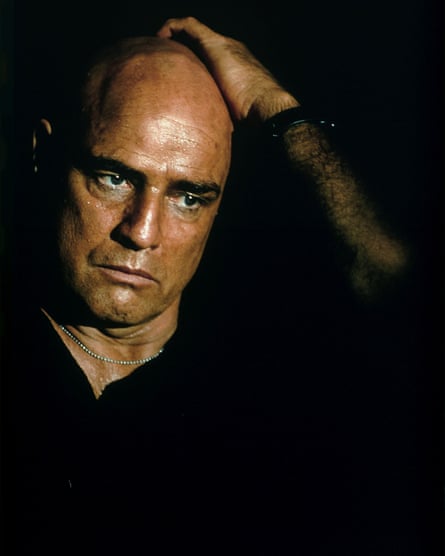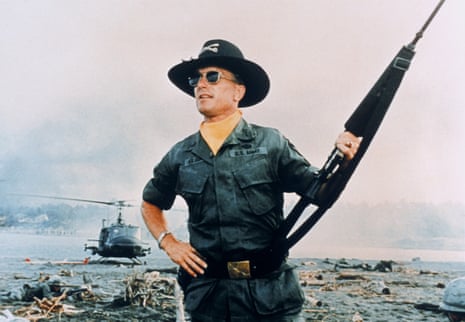‘Someday this war’s gonna end,” is the sage comment from surf-crazed Wagner enthusiast Lieutenant Colonel Kilgore, brusquely played by Robert Duvall. In fact, when Francis Ford Coppola’s grandiose epic masterpiece Apocalypse Now was first unveiled in 1979, the Vietnam war had only ended four years previously, and the succeeding war between Vietnam and Cambodia (where the film’s climax is set) was in full swing.
Coppola’s bad trip into south-east Asia was co-written by John Milius with narration written by Michael Herr. It was inspired by Joseph Conrad’s novel Heart of Darkness, Herr’s own Vietnam reportage-memoir Dispatches and maybe at one further remove by Rudyard Kipling’s lines about the US taking up the white man’s imperial burden. It was famously an ordeal for all concerned. The production involved a filming expedition in the Philippines that felt hardly less colossal and traumatic to the participants than the actual war, though it became commonplace in Hollywood’s Vietnam for the anguish of American soldiers, not that of the Vietnamese people themselves, to be seen as important. (The nearest that Vietnamese people get to actual importance in Apocalypse Now is the four South Vietnamese intelligence officers, executed by Col Kurtz as Communist spies, whose ID cards we briefly see.) Like Lawrence of Arabia, moreover, this is a film without women – or mostly.
Now Apocalypse Now has resurfaced for its 40th-anniversary in what Coppola is calling his definitive final cut. Interestingly, this does not mean simply including everything he shot. He has removed some of the “Playmate” sequences that were in his 202-minute “Redux” edition from 2001, but this cut retains the extended “dinner party” scene with French planters in the jungle, like an encounter with angry imperial ghosts.
Martin Sheen plays Captain Benjamin Willard, a troubled officer, recovering – or not recovering – from a breakdown caused by his last tour of Vietnam. He is tasked by hatchet-faced intelligence chiefs with travelling with a small crew upriver into Viet Cong territory and into Cambodia. There he is expected to track down the renegade Colonel Walter Kurtz – an extraordinary cameo by Marlon Brando – and “terminate his command”, because this once brilliant officer has, as the Brit imperialist used to say, gone native, and become drunk with power, ordering executions. He is rumoured to be revered as a chieftain, or worshipped as a pagan god, and lost his mind through having been vouchsafed some terrible vision of humanity in the jungle itself.

And so Willard sets off into the Boschian chaos, encountering Kilgore, who gives him diversionary air cover to get his boat to the river’s strategic entry point with his bizarre “Air Mobile” helicopter cavalry attack blaring Wagner from the sound-system. It is one of the most staggering war-movie set pieces in history. Willard and his men carry on upriver: Tyrone (Laurence Fishburne), Lance (Sam Bottoms), Chef (Frederic Forrest), and Chief (Albert Hall) - until Willard arrives at the sinister jungle clearing itself, with corpses hung everywhere; they encounter Kurtz’s acolyte: the crazy, gurning photojournalist (Dennis Hopper) – a countercultural parody, like a cross between Charles Manson (whose fate Willard had noticed in a newspaper headline) and one of Manson’s followers. It is presumably this character who has painted the graffiti: “Our Motto: Apocalypse Now” on to a nearby rock.
Brando’s charisma sells the climactic scenes with Willard; without his presence, the literary musings would be a little callow. But his unmistakably adenoidal whispered aria about tribespeople cutting off their children’s arms rather than submit to inoculation always delivers a sickening blow. Sheen, meanwhile, is strong and charismatic as Willard, becoming more fascinated and awestruck by Kurtz’s reputation the closer he gets to his quarry. Each time I watch this film, though, I always regret, just a little, that Willard hasn’t a bit more to say for himself, especially as he has this avowed need to “confront” Kurtz. But his mute presence is potent enough.
Finally, Apocalypse Now finds its triumph in restating the inhumanity of empire. Like many a colonial planter, Colonel Kurtz finds it intensely pleasurable, even ecstatic, to feel himself superior to the subjugated peoples. Having tested his strength against theirs, he affects to admire their supposed primitive honesty and authenticity as superior to the white civilisation he has transcended. But having contemptuously left behind his former identity, he feels how desolate and futile is his existence as both human and god.

Comments (…)
Sign in or create your Guardian account to join the discussion